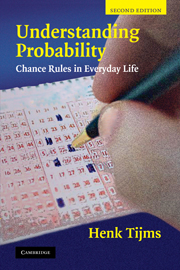Book contents
- Frontmatter
- Contents
- Preface
- Introduction
- PART ONE PROBABILITY IN ACTION
- 1 Probability questions
- 2 The law of large numbers and simulation
- 3 Probabilities in everyday life
- 4 Rare events and lotteries
- 5 Probability and statistics
- 6 Chance trees and Bayes' rule
- PART TWO ESSENTIALS OF PROBABILITY
- Appendix Counting methods and ex
- Recommended reading
- Answers to odd-numbered problems
- Bibliography
- Index
1 - Probability questions
from PART ONE - PROBABILITY IN ACTION
- Frontmatter
- Contents
- Preface
- Introduction
- PART ONE PROBABILITY IN ACTION
- 1 Probability questions
- 2 The law of large numbers and simulation
- 3 Probabilities in everyday life
- 4 Rare events and lotteries
- 5 Probability and statistics
- 6 Chance trees and Bayes' rule
- PART TWO ESSENTIALS OF PROBABILITY
- Appendix Counting methods and ex
- Recommended reading
- Answers to odd-numbered problems
- Bibliography
- Index
Summary
In this chapter, we provide a number of probability problems that challenge the reader to test his or her feeling for probabilities. As stated in the Introduction, it is possible to fall wide of the mark when using intuitive reasoning to calculate a probability, or to estimate the order of magnitude of a probability. To find out how you fare in this regard, it may be useful to try one or more of these 12 problems. They are playful in nature but are also illustrative of the surprises one can encounter in the solving of practical probability problems. Think carefully about each question before looking up its solution. All of the solutions to these problems can be found scattered throughout the ensuing chapters.
Question 1. A birthday problem (§3.1, §4.2.3)
You go with a friend to a football (soccer) game. The game involves 22 players of the two teams and one referee. Your friend wagers that, among these 23 persons on the field, at least two people will have birthdays on the same day. You will receive ten dollars from your friend if this is not the case. How much money should you, if the wager is to be a fair one, pay out to your friend if he is right?
Question 2. Probability of winning streaks (§2.1.3, §5.9.1)
A basketball player has a 50% success rate in free throw shots. Assuming that the outcomes of all free throws are independent from one another, what is the probability that, within a sequence of 20 shots, the player can score five baskets in a row?
- Type
- Chapter
- Information
- Understanding ProbabilityChance Rules in Everyday Life, pp. 11 - 16Publisher: Cambridge University PressPrint publication year: 2007



